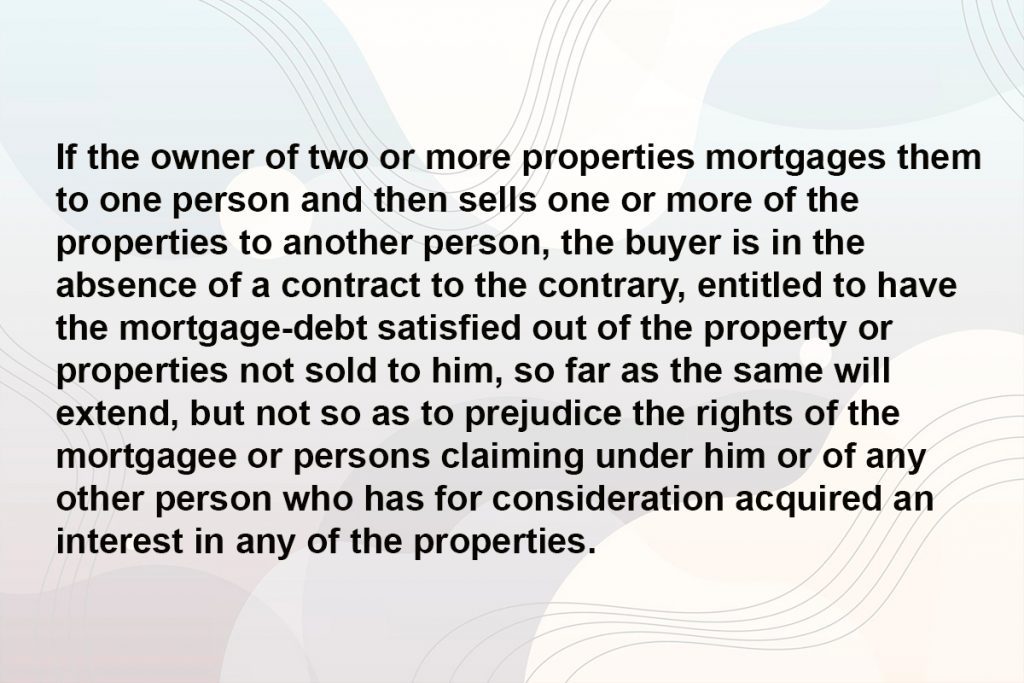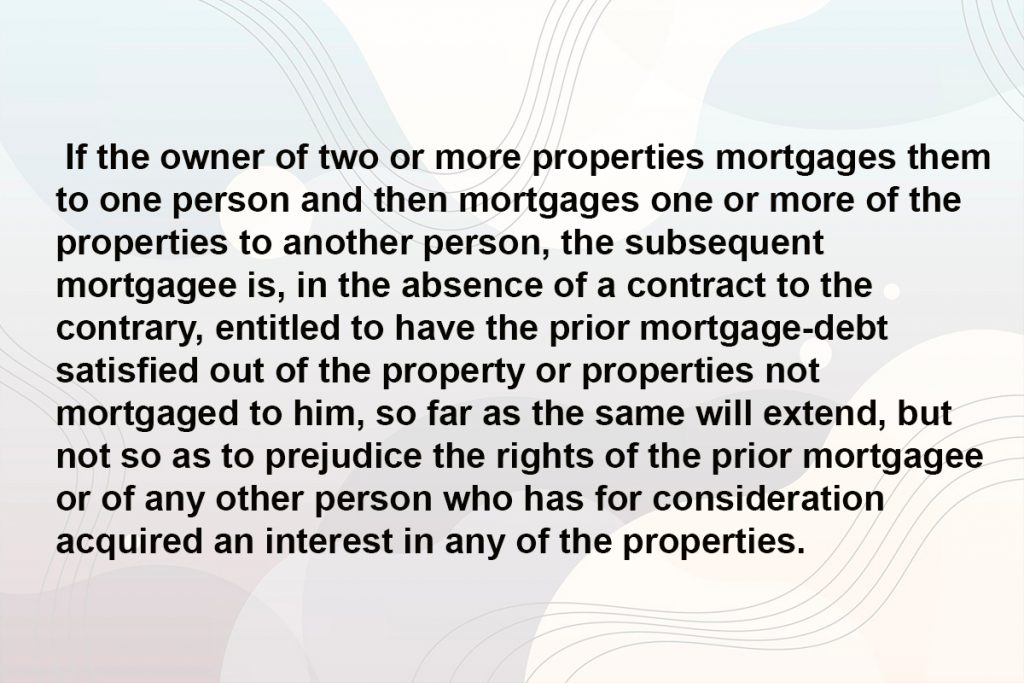In this blog, we will explain the doctrine of marshalling, which is embodied under section 56 and section 81 of the Transfer of Property Act, 1882. We will discuss the essential ingredients, the purpose, the underlying principles and the effects, and the scope of applicability of the doctrine of marshalling.
In simple words, marshalling connotes arranging or assembling something in a proper way. The doctrine of marshalling is inserted under two sections of TPA, 1882. Section 56 of TPA, 1882 promulgates the rules in respect of marshalling by subsequent purchaser and Section 81 of TPA, 1882 prescribes the rules in respect of marshalling securities.
What is Doctrine of Marshalling under TPA, 1882?
The doctrine of marshalling entitles the subsequent purchaser and puisne mortgagee to claim the right of marshalling. When a creditor or mortgagee has the opportunity to satisfy his claims out of several properties of the debtor or mortgagor, then in the absence of a contract to the contrary, such creditor or mortgagee shall not by exercising his right prejudice another creditor or mortgagee, whose securities or properties constitutes just one of those properties.
Section 56 and 81 of the TPA, 1882 are applicable in a situation where the mortgagees have the same debtor or mortgagor. The debtor or mortgagor should be owner of two or more properties.
The Underlying Principle of Doctrine of Marshalling
The doctrine of marshalling is originated from the equitable principles of justice and good conscience.
Lord Eldon elaborated the doctrine of marshalling in the case of Aldrich v Cooper [1803] 32 ER 402. He said –
“If a creditor has two funds, the interest of the debtor shall not be regarded, but the creditor having two funds shall take that which, paying him will leave another fund for another creditor.”
The doctrine of marshalling is the by-product of the equity, justice and good conscience. The courts of equity thought that it would be grave injustice to deprive the subsequent purchaser or puisne mortgagee of their equitable rights in the property.
Section 56 of the TPA, 1882
Section 56 of tpa says,
This section mainly deals with the subsequent purchaser, who has a right to claim marshalling. This section is operative between the purchaser and the original mortgager and not between one purchaser and another. Marshalling is not allowed in order to prejudice the rights and interests of the mortgagees or other persons claiming under the original mortgagor. Section 56 is operative only when right to marshalling is claimed by a purchaser and the party against whom it is claimed is the original mortgagor.
Essential Ingredients of Section 56 of TPA, 1882
The followings are the essential ingredients of section 56 –
- The owner must have two or more properties;
- There must a common mortgagor or debtor between two or more mortgagees;
- The owner must sell one or more properties out of those properties to a purchaser after mortgaging them to the mortgagee;
- The doctrine of marshalling will not be applied to prejudice the rights of third parties.
Effects of Section 56 of TPA, 1882
Under this section the subsequent purchaser has given a power to make the mortgagee satisfy his debts out of the properties which are not sold to the purchaser. If a mortgagee has obtained a foreclosure decree, then he will be entitled to the protection of this section as a purchaser.
In the case of Mahatab Uddin v Nim Chandra Shaha 4 DLR 95 the court said that although a mortgagee has a right to have all properties mortgaged to him to put up for sale, the court has a discretionary power to make an arrangement in which the properties should be sold without prejudicing the interest of the mortgagees.
Exceptions to Section 56 of TPA, 1882
Section 56 does not apply in the following cases –
- Auction Sale
- Leases
- Purchases subject to prior encumbrance
Section 81 of TPA, 1882
Section 81 of Tpa says,
Under this section the puisne mortgagee has been given a right to arrange the order in which the mortgage debt is to be satisfied by prior mortgagees. Right to marshalling is not allowed in order to deliberately or willingly cause injury to others. The subsequent mortgagee can not exercise this right to prejudice the rights of the prior mortgagee or of others who have obtained an interest for consideration or for value. This right is subject to contract between the parties.
Essential Ingredients of Section 81 of TPA, 1882
The followings are the essential ingredients of section 81 –
- The owner must have two or more properties;
- The owner must mortgage those properties to one mortgagee and afterwards mortgages one or more of the properties to a puisne mortgagee;
- There must be a common mortgagor between two or more mortgagees;
- The doctrine of marshalling will not be applied to prejudice the rights of third parties.
Effects of Section 81 of TPA, 1882
Under this section the subsequent or puisne mortgagee has been given a power to make the prior mortgagee satisfy his debts out of the properties which are not mortgaged to the puisne mortgagee. This right is given against the mortgagor. When the prior mortgagee wants to satisfy his mortgage debt, it is the material time to exercise the right of marshalling.
Purpose of Section 56 and Section 81 of TPA, 1882
The purpose of these two sections is to give shield to the subsequent purchaser and mortgagee in respect of properties sold or mortgaged to them.
Limitations Imposed by Section 56 and 81 of TPA, 1882
Right of marshalling can only be availed of by following three limitations.
- This right cannot be used to prejudice the right of prior mortgagee;
- This right cannot be used to defeat or unduly delay the mortgagees;
- This right cannot be used to cause injury to the rights of third parties.
Most of the doctrines that govern the transfer of property law have been mostly derived from the law of equity, justice, and good conscience. The motive of this doctrine is to ensure that justice has been served to the subsequent mortgagee and purchaser without causing any harm to the prior mortgagees.
- What is Mens Rea and Actus Reus - February 13, 2024
- Case Summary of Anglo Norwegian Fisheries Case | United Kingdom V Norway - April 7, 2023
- What is a Solicitor? How to Become One - January 9, 2023



